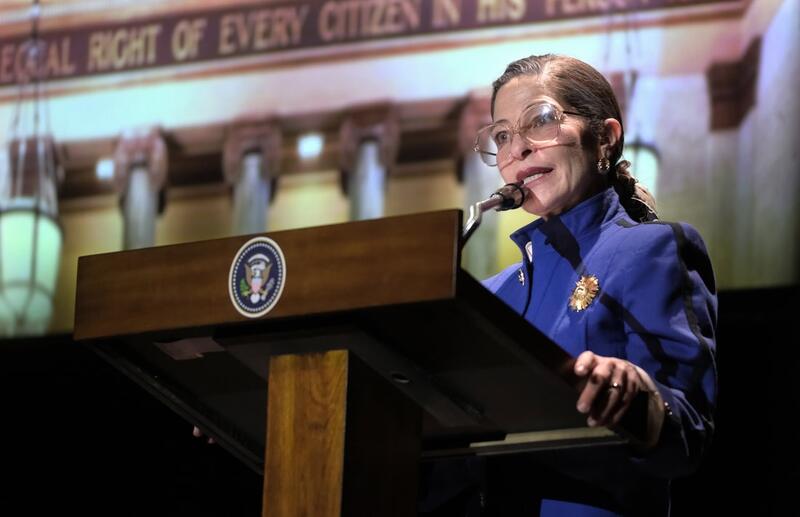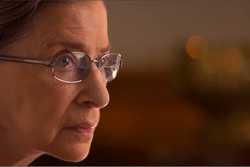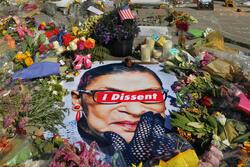What Would Ruth Say?
For the past 18 months or so, I've been touring the country playing Ruth Bader Ginsburg. This one-woman show by Rupert Holmes, entitled All Things Equal, has taken me on the most extraordinary journey of my life. The text is the most challenging I’ve ever had to learn and to command. But the biggest hurdle—and one I hadn’t anticipated—was the soul-searching I had to do for the role. Until I had spent time really questioning my own place within womanhood, I couldn’t authentically stand on stage and "become" RBG.
A few months ago, when I entered the lobby of the Curran theatre in San Francisco to meet some friends after the show, a woman caught my eye. She stood shyly nearby, waiting. Her dark eyes and warm smile somehow felt familiar. Never wanting anyone to feel out of place, I introduced myself. "I’m Michelle. Thanks for coming to see the show.”
I pulled this new woman, Sarah, into our conversation. I spied her ring, so similar to my own. She said she got hers in Israel. I smiled. “Me too.”
Our test of one another. A tacit agreement that we spoke a shared language. She ventured on. "I wanted to ask you…" She trailed off. She didn’t need to finish. I knew what question was coming.
"I know you’re playing a character, and can’t fully know what she would say…but, well, what would Ruth say about the war right now, about what’s been going on since October 7?"
I nodded gravely. I got it. Her question. Her need to ask it.
"I’ve been trying to write about it since day one," I admitted. And I have. But daily, I come up short, as the parade of new horrors hits our headlines and threaten any semblance of clarity.
But suddenly, I heard myself say with confidence, “First and foremost, Ruth would remind us of her own words, that women belong in ALL places where decisions are being made.” I told Sarah I couldn't imagine that women would have IGNORED the intelligence from the border guards, many of whom were themselves women, regarding the unusual activity they saw on the border with Gaza in the months before October 7. Women see power so differently than men and tend towards a more collaborative attitude in leadership.
I think this different leadership style stems from the values emblazoned upon Ruth by her mother, Celia, a first-generation American who once said, “Emotions such as anger or jealousy do not advance one's ability to persuade.” I think Ruth would be horrified to see the chasms we have dug since the attack. People seem to be “fighting for the things that they care about,” to paraphrase another famous RBG quote, but, as we’ve seen recent campus protests, these fights often overflow with venom, a deep-seated hatred that has rendered us unable to hear one another.
Though my conversation with Sarah quickly became quite heavy, it was also such a relief. To have this impromptu, Shabbat afternoon post-show havruta was just what I needed for my lonely, tired soul. In each city where I performed, I asked myself, “What can I do during this stop of our tour that might offer this community a new way to think about the situation we find ourselves in? “I try to engage the same way Ruth might, to calmly ask questions of the many people I meet: the taxi driver playing an Arabic news station on the radio, the store manager with a hamsa and Hebrew name dangling on their necklace, but with only pro-Palestinian and hateful anti-Zionist slogans in the store window, and the young women wearing hijabs next to me at the airport who share the heartbreak of their family in Gaza, and allow me to share my own heartbreak back.
When I engage with an open heart rather than a specific agenda, the conversation goes well. Often, though, I am derailed by emotion, my personal attachments, and by my shock, even after all this time, at the declarations people make with only marginal knowledge. I literally feel myself “losing” my case in those moments and realize, again, that I have a lot to learn from the notorious RBG.
I looked at Sarah, this brave audience member I probably would never see again. We talked about the backdrop of loss that accompanied Ruth’s formative years, the deaths of her sister and mother, and also the deep connection Ruth had to Anne Frank, who was only a few years older than Ruth. The Holocaust and the devaluation of Jewish people, both in America and abroad, predominated their Brooklyn lives in the 1940s. Thirteen-year-old Ruth wrote about it in her temple’s newsletter: “We are part of a world whose unity has been completely shattered. No one can feel free from danger until the threads of civilization are bound together once again.”
I want to believe Ruth would unequivocally support Israel, but I'm not so sure of anything right now. I know I have sometimes been naive about Israel, the country that offered a safe haven to my Iraqi-born father and his family, the place that called to me as a young adult, whose people and energy anchored me to a joy I had never experienced. I shared these feelings with my new friend, Sarah. She shared back without words, her warm smile and wet eyes holding my gaze. Maybe we were feeling helpless. Maybe we were feeling held.
Over the past few months, I’ve thought of this exchange often. I’m grateful for the opportunity to use the words of this late, great beacon of wisdom and dignity. My hope is to spark conversations in dignity and respect as we somehow work to mend and deepen the connections between us.






